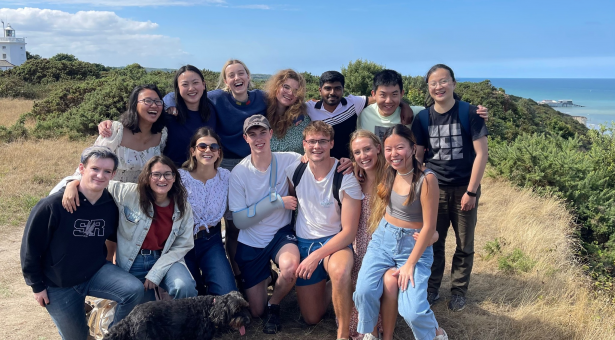International Undergraduate Summer School

The Undergraduate Summer School is a unique opportunity for undergraduates from all corners of the world to spend eight weeks at our internationally renowned research centre, partnering with fellow Norwich Research Park institutes; The Sainsbury Laboratory and the Earlham Institute.
The 2024 Undergraduate Summer School will take place from 30th June – 23rd August 2024.
Application deadline is 19th January 2024 for any interested participants.
Students experience plant and microbial science, interacting with some of our world-leading scientists and gain an unrivalled insight into research.
One afternoon each week is dedicated to training events that cover activities such as science communication, computer programming, field studies, advanced presentation skills, and discussions with students from previous years about career development.
Social interactions and teamwork are encouraged throughout, with activities including make-your-own pizza, a bat walk and BBQs.
The programme culminates in a two-day conference on the beautiful North Norfolk coast where students present and share their research.
Our International Undergraduate Summer School includes;
- £250 per week stipend
- Free accommodation in your own en-suite room, with a shared kitchen and within walking distance of the John Innes Centre
- A programme of training, research, seminars, workshops and social events
- The opportunity to be part of a world-renowned scientist’s laboratory and contribute to their research
This is your opportunity to experience life in a world-leading scientific institute across a variety of biological and chemical sciences; including microbiology, cell biology, biochemistry, chemistry, genetics, molecular biology and computational and mathematical biology.
Click here for Frequently Asked Questions (FAQs).
2024 Projects
We have a huge range of projects available as part of the 2023 Undergraduate Summer School.
Below are a list of the project titles, grouped by departmental research area, alongside the laboratory senior scientist.
Cell and Developmental Biology
- Shaping Diversity – Enrico Coen
- Root legume nodulation and arbuscular mycorrhiza signalling – Myriam Charpentier
- Exploring the evolution of plant-pathogen interactions – Phil Carella
- How do living organisms tell the time? – Antony Dodd
- Cell-to-cell communication during pathogen attack – Christine Faulkner
Computational and Systems Biology
- Molecular dynamics simulations for studying phase separation – Richard Morris
Crop Genetics
- Wheat Genetics – Simon Griffiths
- How do we protect wheat from a cereal killer? – Diane Saunders
- How to get radial; unlocking the mechanisms for symmetry establishment in plant organs – Laila Moubayidin
- Molecular biology of plant-insect interactions – Saskia Hogenhout
- Boosting nutrition in wheat – Philippa Borrill
- Investigating role of plant hormones and nitrogen in reproductive development of Brassica crops – Steve Penfield
Biochemistry and Metabolism
- Molecular mechanisms of starch synthesis in plants and applications for improving crop quality – David Seung
- Engineering plant immunity for improved food security – Mark Banfield
- Mechanisms of photosynthetic protein production in plants – Michael Webster
- Characterisation of a new antibiotic active against Gram-negative bacteria – Dmitry Ghilarov
- Genetic lockdown of root disease: improving the benefits of nitrogen-fixing crops – Sanu Arora
- Regulation of iron uptake in plants and for human nutrition – Janneke Balk
Molecular Microbiology
- Investigating how Pseudomonas bacteria colonise plant root systems – Jacob Malone
- Understanding plasmid segregation to prevent plasmid-borne antimicrobial resistance – Tung Le
- Hunting for new phages to trigger chemical defence in soil bacteria – Susan Schlimpert
The Sainsbury Laboratory
- Functional and evolutionary dynamics of plant NLR immune receptors – Sophien Kamoun
- Investigating plant immune receptors – Jonathan Jones
- Understanding how fungi cause disease in plants – Nick Talbot
- Understanding how pathogens cause disease in plants – Wenbo Ma
Earlham Institute
- Exploring genome variation and structure in crop populations using bioinformatic methods – Jose de Vega
What previous students had to say
“The research experience has helped me learn a lot of things that I would not have thought about learning. My supervisor and the research group are patient and supportive. I had fun spending time with people in the summer school and my research group.”
“I have really enjoyed the Summer School. Two month here were both fun and useful for my future career. The opportunity to meet so many great scientist and work in a motivating environment such as JIC definitely empowered my will to pursue a career in research. I also enjoyed Friday workshops, especially those about public speaking/presenting since they were a great opportunity to learn new skills in such a short period of time. Overall, I am really happy that I could be a participant of the Summer School and the experience I gained here is invaluable.”
“An excellent insight into the world of scientific research, which not only broadened my skillset and career aspirations but was great fun.”
“I feel very privileged to have been given the opportunity to improve and extend my scientific education and to have been able to work in a scientific environment with many influential and respected scientists. It also gave me the chance to work and socialise with 14 other students who share similar interests to me and has created many friendships.”
“The summer school made me a better scientist, and I made some amazing new friends.”
“The Summer School experience, set in the incredibly positive environment of John Innes Centre, has given me an incomparable insight into research career paths and has made me even more aware of how incredibly surprising and stimulating daily lab’s life can be, interacting with scientists and students from around the world.”
Supporters
The International Undergraduate Summer School is supported by;
- The John Innes Centre
- The Sainsbury Laboratory
- The Earlham Institute
- The John Innes Foundation
